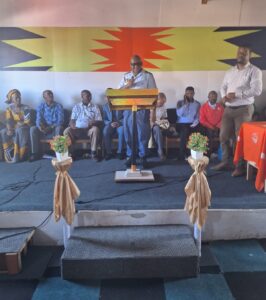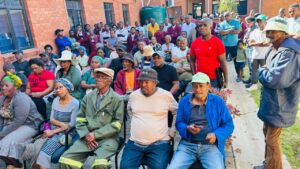
By Sweetness Pullen
The Kagisano Programme is implemented in six provinces across 16 sites including Motherwell, situated in Gqeberha, Eastern Cape.
This year’s 16 Days of Activism campaign comes at a time when Motherwell is experiencing an increase in violent incidents stemming from initiation schools. Young initiates are increasingly involved in severe criminal activities ranging from murder to rape and theft in nearby areas.
There is also a notable rise in violence within taverns. Despite the ‘Anti Pens Down’ campaign aimed at educating post-matric students about the hazards of alcohol consumption, alcohol abuse among them is on the rise.
We have also seen an increase of alcohol abuse in informal settlements with high incidents of rape cases. Reporting such incidents is challenging due to the remote locations of police stations. In these communities, alcohol emerges as a primary contributor to gender-based violence (GBV).
During this holiday season, we anticipate a spike in GBV often driven by the festive atmosphere and year-end celebrations.
With these challenges in place, during this 16 Days of Activism against GBV campaign, we adopted a unique strategy, shifting our focus from community gatherings to reaching out to individuals directly in GBV hotspots. Recognising that GBV often occurs in specific locations where people gather, we strategically deployed Kagisano’s outreach efforts to these hotspots, including sports bars, social clubs, and other areas where individuals gather. This approach ensures that the GBV message is spread to every corner where violence is most prevalent.
In these hotspot areas, we have dialogues with mostly young people, about the importance of establishing boundaries, avoiding conflict, and effectively managing conflict situations to prevent escalation. We also unpack the complexities of GBV, ensuring that community members have a clear understanding of the issue.
Central to this strategy is the empowerment of victims and the promotion of self-awareness. By engaging with individuals directly in GBV hotspots, the programme equips them with the knowledge and resources to identify, understand, and prevent violence.
We acknowledge that addressing GBV requires a holistic approach that tackles not only the immediate consequences of violence but also its underlying causes. Kagisano’s healing spaces have been instrumental in changing mindsets and promoting positive change. These spaces provide safe and supportive environment where individuals address deep-seated issues including unprocessed trauma, unemployment, and the transition from adolescence to adulthood. All of these issues significantly impact the way individuals navigate their journey into adult life and often contribute to violence. In these spaces, the Kagisano programme, offers personal development, self-awareness, effective communication, conflict resolution, coping with peer pressure, and other areas typically overlooked in home environments.

The Kagisano Programme’s journey has been a continuous process of learning and change. One of the key challenges lies in addressing the normalisation of violence, particularly GBV, within certain communities. Efforts to confront this issue are often dismissed as adopting a ‘westernised’ perspective.
We have learned that effectively tackling GBV requires consistent advocacy for behavioural and attitudinal change. Effective engagement with diverse individuals necessitates a sensitivity to their cultural and social backgrounds, allowing for tailored approaches that resonate with the community. Often, organisations and colleagues fail to communicate effectively, overlooking the community’s level of understanding and chosen lifestyle. Addressing this gap can significantly enhance the impact of our efforts in combating GBV.
The Kagisano Programme’s innovative approach to tackling GBV serves as a model for other communities seeking to combat this pervasive issue. The programme demonstrates the power of a community-driven approach to eradicating violence.
Going forward, we hope to see a violence-free Motherwell, one where individuals can thrive and live in peace. While the Kagisano programme is here to assist in fighting violence, we must all work hand in hand to empower and transform our community. There is power in collective action, and with that we can eradicate violence, particularly gender-based violence.
Sweetness Pullen is the Kagisano Programme’s Implementing Partner Representative in the Motherwell area.